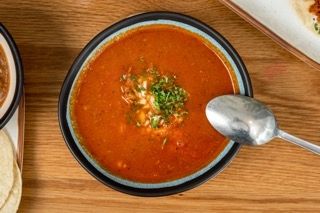Discover why churros are a must-try after every dinner
Wiki Article
Is Mexican Food Healthy? Unloading the Nutritional Conveniences of Traditional Components
The question of whether Mexican food is healthy welcomes an expedition of its traditional components. Beans and corn work as foundational staples, rich in protein and fiber. Avocados give advantageous fats, while different natural herbs and seasonings add flavor and health and wellness benefits - churros. Together, these elements develop a tapestry of nourishment. Nonetheless, the healthiness of Mexican cuisine typically depends upon preparation methods and part dimensions. What function do these aspects play in establishing its overall nutritional value?The Power of Beans: Healthy Protein and Fiber-Rich Staples
Typically overlooked, beans serve as a foundation of Mexican food, using a wealth of nutritional benefits. Rich in healthy protein, they are an excellent plant-based alternative for those seeking to satisfy their nutritional protein needs. This high healthy protein web content sustains muscle mass repair service and development, making beans invaluable for both vegetarians and meat-eaters alike. Additionally, beans are an outstanding source of dietary fiber, which assists in food digestion and promotes a sensation of volume, potentially assisting with weight monitoring.The selection of beans utilized in Mexican dishes, such as black beans, pinto beans, and kidney beans, adds to a diverse taste profile and can boost dishes nutritionally. Beans are reduced in fat and have necessary vitamins and minerals, including folate, iron, and magnesium. With each other, these qualities make beans an important ingredient, providing both nourishment and food in conventional Mexican price.

Corn: a Versatile Grain With Nutritional Advantages
Corn sticks out as a functional grain fundamental to Mexican cuisine, celebrated not only for its culinary applications however additionally for its impressive nutritional profile. As a main component in recipes like tortillas, tamales, and pozole, corn gives necessary nutrients that contribute to a well balanced diet. Rich in carbs, it functions as a substantial power resource, while additionally being reduced in fat, making it a favorable alternative for different dietary requirements.Additionally, corn is an excellent source of nutritional fiber, which helps in food digestion and promotes satiety. It consists of considerable amounts of vitamins such as B-complex vitamins, which are vital for basal metabolism. The existence of anti-oxidants, specifically carotenoids, contributes to general health and wellness by decreasing oxidative tension. Additionally, corn is gluten-free, satisfying those with gluten sensitivities. Overall, the dietary advantages of corn highlight its significance in traditional Mexican food and its role in a healthy and balanced diet plan.
Avocados: Healthy And Balanced Fats and Nutrients in Every Bite
Avocados play a substantial function in Mexican cuisine, enhancing recipes with their velvety texture and abundant flavor. Past their culinary charm, avocados are celebrated for their remarkable dietary profile. They are a rich resource of healthy monounsaturated fats, which can help lower poor cholesterol degrees and support heart health. Additionally, avocados are loaded with vital minerals and vitamins, consisting of potassium, vitamin E, and B vitamins, adding to total wellness.The high fiber content in avocados help food digestion and promotes satiety, making them a valuable addition to any kind of dish. Their unique nutrient make-up can also support skin health and give anti-inflammatory benefits. Including avocados into typical Mexican dishes or appreciating them as a standalone snack can enhance both taste and nutrition, showing why they are a beloved staple in Mexican food. On the whole, avocados provide a scrumptious method to appreciate healthy fats and critical nutrients in every bite.

Flavors and Natural Herbs: Flavorful Wellness Boosters
While enjoying the rich flavors of Mexican cuisine, one can not neglect the necessary duty that spices and natural herbs play in boosting both taste and health. Ingredients such as cilantro, oregano, and chili peppers not only add to the dynamic flavor profile but also offer considerable wellness benefits. As an example, cilantro is understood for its cleansing homes, assisting to remove hefty steels from the body, while oregano is packed with antioxidants and possesses anti-inflammatory results.Chili peppers, a staple in several Mexican recipes, consist of capsaicin, which has been linked to boosted metabolic rate and pain relief. In addition, flavors like cumin and coriander assistance food digestion and may aid in blood sugar level guideline. Integrating these flavorful wellness boosters into meals not only enhances the cooking experience however also advertises overall health, making Mexican cuisine not just tasty, however likewise nutritionally advantageous.
Typical Cooking Approaches: Enhancing Nutrition and Taste
Standard cooking techniques in Mexican cuisine play an important duty in enhancing both nourishment and flavor, as they usually prioritize fresh ingredients and classic strategies. Strategies such as nixtamalization, where corn is soaked and prepared in an alkaline service, not just improve the nutrient profile of tortillas however also improve their digestibility - take out and delivery. Furthermore, using slow cooking techniques, like cooking or braising, allows flavors to fuse wonderfully while preserving the integrity of the ingredientsFrequently Asked Inquiries
Are Mexican Food Portions Usually Larger Than Other Foods?
Mexican food portions are usually larger than those of several other foods. This characteristic best mexican westchester NY shows traditional dining techniques, emphasizing common sharing and hearty meals, which can cause an extra considerable offering size generally.
Just how Does the Prep Work Approach Affect Healthiness of Mexican Food?
Preparation methods substantially influence the healthiness of Mexican food. Strategies such as grilling or steaming protect nutrients, while frying can enhance harmful fat content. Options of components and cooking designs ultimately figure out total dietary value.Can Mexican Food Be Tailored for Details Dietary Limitations?
Mexican food can without a doubt be tailored for particular dietary limitations. Replacements, such as making use of corn tortillas for gluten-free diets or incorporating more veggies, enable individuals to delight in standard tastes while suiting numerous dietary needs.What Are Common Mistaken Beliefs Concerning Mexican Food and Health?
Typical misunderstandings about Mexican food consist of the idea that it is naturally harmful, extremely spicy, and only concentrated on fats. In truth, standard meals typically include nutritious active ingredients and can be customized to numerous dietary requirements.Exist Much Healthier Alternatives at Mexican Restaurants?
Much healthier alternatives at Mexican restaurants often consist of grilled meats, beans, and fresh vegetables. Picking recipes that emphasize whole components and avoiding heavy sauces can bring about an extra healthy dining experience, promoting total wellness.The range of beans used in Mexican recipes, such as black beans, pinto beans, and kidney beans, adds to a diverse flavor account and can improve meals nutritionally. Avocados play a substantial duty in Mexican cuisine, complementing recipes with their velvety texture and abundant taste. Incorporating avocados right into standard Mexican dishes or enjoying them as a standalone treat can enhance both flavor and nutrition, demonstrating why they are a beloved staple in Mexican food. While enjoying the abundant flavors of Mexican food, one can not ignore the crucial function that spices and natural herbs play in improving both taste and health and wellness. Traditional food preparation methods in Mexican food play a crucial function in improving both nutrition and taste, as they commonly prioritize fresh ingredients and classic strategies.
Report this wiki page